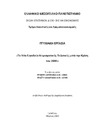| heal.creatorName | Πλαϊτη, Αναστασία | el |
| heal.creatorName | Ρενιέρη, Δέσποινα | el |
| heal.creatorName | Plaiti, Anastasia | en |
| heal.creatorName | Renieri, Despoina | en |
| heal.publicationDate | 2022-05-10 | |
| heal.identifier.primary | http://hdl.handle.net/20.500.12688/10258 | |
| heal.abstract | Σκοπός: Η παρουσίαση των νέων εργαλείων μη-συμβατικής νομισματικής πολιτικής: α) Πρόγραμμα Ποσοτικής Χαλάρωσης, β) Αρνητικά Επιτόκια, και γ) Επικοινωνιακή Καθοδήγηση από τις Κεντρικές Τράπεζες και η διερεύνηση της αποτελεσματικότητα τους.
Μεθοδολογία: Θεωρητική ανάλυση ως προς την λειτουργία της παραδοσιακής νομισματικής πολιτικής από την Κεντρική Τράπεζα σε πρώτο επίπεδο και η ανάλυση της λειτουργίας των νέων εργαλείων μη-παραδοσιακής νομισματικής πολιτικής και η βιβλιογραφική επισκόπηση της αποτελεσματικότητας τους.
Ευρήματα: Οι ενδείξεις και οι έρευνες πριν την εμφάνιση της πανδημίας της covid-19, υποδήλωναν βελτιωμένες συνθήκες χρηματοδότησης και βελτιωμένες μακροοικονομικές επιδόσεις συνολικά στον Ευρωπαϊκό χώρο. Συγχρόνως, πρέπει να διαπιστωθούν και να ερμηνευθούν οι αρνητικές επιπτώσεις των συγκεκριμένων πολιτικών. Τα συγκεκριμένα όρια έχουν αρχίσει να διαφαίνονται πρακτικά στην Ευρωπαϊκή οικονομία, εφόσον το «φάρμακο» της τόνωσης της οικονομικής δραστηριότητας μέσω άφθονης ρευστότητας, ίσως έχει αρχίσει πλέον να λειτουργεί περισσότερο αρνητικά παρά θετικά, με την Ευρωπαϊκή οικονομία να εμφανίζει ιδιαίτερα υψηλό πληθωρισμό στα τέλη του 2021. Παράλληλα, δημιουργούνται και ανησυχίες για την υπερβολική άνοδο των τιμών των περιουσιακών στοιχείων και την αύξηση της οικονομικής ανισότητας μέσω της παρατεταμένης χρήσης των συγκεκριμένων πολιτικών.
Περιορισμοί: Η έρευνά μας περιορίζεται στην ανάλυση της οικονομικής θεωρίας και στην βιβλιογραφική επισκόπηση των σχετιζόμενων επιστημονικών δημοσιεύσεων για την διαπίστωση και αναφορά των κυρίαρχων οικονομικών απόψεων επί του θέματος της εργασίας μας, ενώ ταυτόχρονα εκφράζουμε την υποκειμενική μας άποψη για την χρησιμότητα των νέων νομισματικών πολιτικών. | el |
| heal.abstract | Purpose: The presentation of the new non-conventional monetary policy tools: a) Quantitative Easing, b) Negative Interest Rates, and c) Forward Guidance by central banks and investigation of their effectiveness.
Methodology: Theoretical analysis of the way conventional monetary policy is used by the Central Bank and the operational analysis of the new non-conventional monetary policy tools and the bibliographic review of their effectiveness.
Findings: Economic research prior to the onset of the COVID-19 pandemic indicated improved financing conditions and improved macroeconomic performance overall in the European area. At the same time, the negative effects of these policies must be identified and interpreted. The limits have begun to emerge practically in the European economy, since the "medicine" of stimulating economic activity through ample liquidity, may have now begun to produce more negative than positive results, with the European economy showing particularly high inflation at the end of 2021. At the same time, there are concerns about the excessive rise in asset prices and the increase in economic inequality through the prolonged use of these policies.
Limitations: Our research is limited to the analysis of economic theory and the bibliographic review of the relevant scientific publications in order to identify and report the dominant economic views on the subject of our thesis, also at the same time we express our personal opinions on the usefulness of the new monetary policies. | en |
| heal.language | Ελληνικά | el |
| heal.language | Greek | en |
| heal.academicPublisher | ΕΛ.ΜΕ.ΠΑ., ΣΧΟΛΗ ΕΠΙΣΤΗΜΩΝ ΔΙΟΙΚΗΣΗΣ ΚΑΙ ΟΙΚΟΝΟΜΙΑΣ (ΣΕΔΟ), Τμήμα Λογιστικής και Χρηματοοικονομικής | el |
| heal.academicPublisher | Η.Μ.U, School of Management and Economic Sciences (SMES), Accounting and Finance Dept. | en |
| heal.title | Τα νέα εργαλεία νομισματικής πολιτικής μετά την κρίση του 2008. | el |
| heal.title | New tools of monetary police after the 2008 crisis. | en |
| heal.type | Πτυχιακή Εργασία | el |
| heal.type | Bachelor thesis | en |
| heal.keyword | νομισματική πολιτική, Ευρωπαϊκή Κεντρική Τράπεζα, χρηματοοικονομική κρίση | el |
| heal.keyword | monetary policy, European Central Bank, financial crisis | en |
| heal.access | free | el |
| heal.advisorName | Κυρίκος, Δημήτριος | el |
| heal.advisorName | Kyrikos, Dimitrios | en |
| heal.academicPublisherID | ΕΛ.ΜΕ.ΠΑ. Ελληνικό Μεσογειακό Πανεπιστήμιο | el |
| heal.academicPublisherID | Η.Μ.U Hellenic Mediterranean University | en |
| heal.fullTextAvailability | true | el |
| tcd.distinguished | false | el |
| tcd.survey | false | el |


